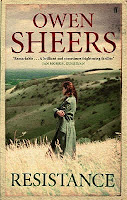James Marsh returned to Edinburgh International Film Festival with his latest drama, Shadow Dancer. The film is released in UK cinemas on Friday 24 August. Read on for my EIFF interview with the Oscar-winning director.
Interview: James Marsh on Shadow Dancer
James Marsh returned to Edinburgh International Film Festival with his latest drama, Shadow Dancer. The film is released in UK cinemas on Friday 24 August. Read on for my EIFF interview with the Oscar-winning director.
